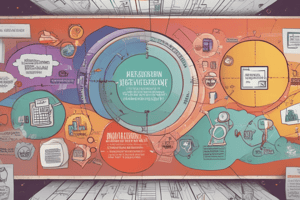Podcast
Questions and Answers
Which management theory emphasizes the importance of teamwork and collaboration?
Which management theory emphasizes the importance of teamwork and collaboration?
- Classical Management Theory
- Quantitative Management Theory
- Behavioral Management Theory (correct)
- Contingency Management Theory
What is a key focus of Quantitative Management Theory?
What is a key focus of Quantitative Management Theory?
- Mathematical models and statistical methods (correct)
- Organizational culture
- Human behavior and motivation
- Bureaucratic structure
Which management theory suggests that there is no one-size-fits-all approach?
Which management theory suggests that there is no one-size-fits-all approach?
- Modern Management Theories
- Systems Management Theory
- Contingency Management Theory (correct)
- Classical Management Theory
Who is a key contributor to Classical Management Theory known for Scientific Management?
Who is a key contributor to Classical Management Theory known for Scientific Management?
Total Quality Management (TQM) is primarily focused on which of the following?
Total Quality Management (TQM) is primarily focused on which of the following?
Systems Management Theory is concerned with the relationships between which components?
Systems Management Theory is concerned with the relationships between which components?
Which management style is characterized by flexibility and collaboration, especially in project management?
Which management style is characterized by flexibility and collaboration, especially in project management?
In which type of management theory is the optimization of complex processes a focus area?
In which type of management theory is the optimization of complex processes a focus area?
Flashcards are hidden until you start studying
Study Notes
Management Theories
-
Classical Management Theory
- Focuses on efficiency and effectiveness.
- Key contributors:
- Frederick Taylor - Scientific Management
- Henri Fayol - Administrative Theory
- Max Weber - Bureaucratic Management
- Emphasizes clear hierarchy and standardization of tasks.
-
Behavioral Management Theory
- Emphasizes the human aspect of management.
- Key contributors:
- Mary Parker Follett - Importance of teamwork and collaboration.
- Elton Mayo - Hawthorne Studies, highlighting the impact of social relations on productivity.
- Focuses on motivation, group dynamics, and leadership styles.
-
Quantitative Management Theory
- Utilizes mathematical models and statistical methods.
- Key areas:
- Operations Research - Optimizing complex processes.
- Management Information Systems - Data-driven decision-making.
- Emphasizes efficiency and quantitative data for managerial decisions.
-
Systems Management Theory
- Views organizations as interrelated systems.
- Key concepts:
- Inputs, processes, outputs, and feedback loops.
- Emphasis on interaction and relationships between different parts of the organization.
- Recognizes the complexity of organizational environments.
-
Contingency Management Theory
- Suggests that management practices should vary based on the situation.
- No one-size-fits-all approach; success depends on context.
- Factors influencing management style include:
- Environment, technology, size of the organization, and workforce characteristics.
-
Modern Management Theories
- Total Quality Management (TQM): Focuses on continuous improvement and customer satisfaction.
- Lean Management: Aims to reduce waste and increase process efficiency.
- Agile Management: Emphasizes flexibility, collaboration, and customer feedback, particularly in project management.
-
Strategic Management Theory
- Focuses on long-term goals and overall direction of the organization.
- Involves analysis of competitive environment and internal capabilities.
- Key tools include SWOT analysis, PEST analysis, and Porter's Five Forces.
-
Cultural Management Theory
- Recognizes the impact of organizational culture on management practices.
- Emphasizes the values, beliefs, and behaviors shared by members of the organization.
- Important for change management and employee engagement.
-
Postmodern Management Theory
- Challenges traditional management concepts and hierarchies.
- Emphasizes decentralized decision-making and fluid organizational structures.
- Focuses on diversity, ethics, and social responsibility in management practices.
Classical Management Theory
- Centers on maximizing efficiency and effectiveness in organizations.
- Key contributors: Frederick Taylor (Scientific Management), Henri Fayol (Administrative Theory), Max Weber (Bureaucratic Management).
- Stresses the importance of a clear hierarchy and the standardization of tasks for optimal performance.
Behavioral Management Theory
- Highlights the significance of human factors in management practices.
- Key contributors include Mary Parker Follett, who advocated for teamwork, and Elton Mayo, who conducted the Hawthorne Studies revealing the importance of social relations on productivity.
- Focuses on understanding motivation, group dynamics, and various leadership styles in the workplace.
Quantitative Management Theory
- Leverages mathematical models and statistical methods to inform management.
- Key areas encompass Operations Research for process optimization and Management Information Systems for data-driven decision-making.
- Prioritizes efficiency and numerical data as critical elements in managerial decisions.
Systems Management Theory
- Conceptualizes organizations as interdependent systems.
- Key concepts involve inputs, processes, outputs, and crucial feedback loops.
- Emphasizes the interactions and relationships among different parts of the organization, acknowledging organizational complexity and environmental factors.
Contingency Management Theory
- Advocates for tailored management practices depending on the context.
- Rejects a one-size-fits-all approach; highlights that effectiveness is contingent on multiple factors including the environment, technology, organizational size, and workforce characteristics.
Modern Management Theories
- Total Quality Management (TQM): Centers around continuous improvement processes and enhancing customer satisfaction.
- Lean Management: Focuses on reducing waste and streamlining processes for better efficiency.
- Agile Management: Emphasizes adaptability, collaboration, and incorporating customer feedback, particularly in project management settings.
Strategic Management Theory
- Concentrates on defining long-term objectives and the overall strategic direction of organizations.
- Involves thorough analysis of competitive landscapes and internal strengths and weaknesses.
- Utilizes tools such as SWOT analysis, PEST analysis, and Porter's Five Forces to guide strategic planning.
Cultural Management Theory
- Acknowledges how organizational culture influences management practices and employee behavior.
- Focuses on the shared values, beliefs, and attitudes among members of the organization as critical factors.
- Plays a significant role in change management initiatives and fostering employee engagement.
Postmodern Management Theory
- Proposes a critique of traditional management paradigms and hierarchies.
- Emphasizes decentralized decision-making processes and more fluid organizational structures.
- Prioritizes diversity, ethical practices, and social responsibility within management frameworks.
Studying That Suits You
Use AI to generate personalized quizzes and flashcards to suit your learning preferences.




